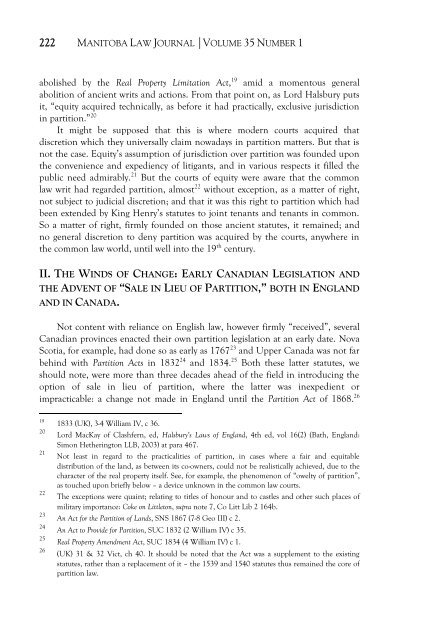Download PDF - Robson Hall Faculty of Law
Download PDF - Robson Hall Faculty of Law
Download PDF - Robson Hall Faculty of Law
You also want an ePaper? Increase the reach of your titles
YUMPU automatically turns print PDFs into web optimized ePapers that Google loves.
222 MANITOBA LAW JOURNAL |VOLUME 35 NUMBER 1<br />
abolished by the Real Property Limitation Act, 19 amid a momentous general<br />
abolition <strong>of</strong> ancient writs and actions. From that point on, as Lord Halsbury puts<br />
it, “equity acquired technically, as before it had practically, exclusive jurisdiction<br />
in partition.” 20<br />
It might be supposed that this is where modern courts acquired that<br />
discretion which they universally claim nowadays in partition matters. But that is<br />
not the case. Equity’s assumption <strong>of</strong> jurisdiction over partition was founded upon<br />
the convenience and expediency <strong>of</strong> litigants, and in various respects it filled the<br />
public need admirably. 21 But the courts <strong>of</strong> equity were aware that the common<br />
law writ had regarded partition, almost 22 without exception, as a matter <strong>of</strong> right,<br />
not subject to judicial discretion; and that it was this right to partition which had<br />
been extended by King Henry’s statutes to joint tenants and tenants in common.<br />
So a matter <strong>of</strong> right, firmly founded on those ancient statutes, it remained; and<br />
no general discretion to deny partition was acquired by the courts, anywhere in<br />
the common law world, until well into the 19 th century.<br />
II.<br />
THE WINDS OF CHANGE: EARLY CANADIAN LEGISLATION AND<br />
THE ADVENT OF “SALE IN LIEU OF PARTITION,” BOTH IN ENGLAND<br />
AND IN CANADA.<br />
Not content with reliance on English law, however firmly “received”, several<br />
Canadian provinces enacted their own partition legislation at an early date. Nova<br />
Scotia, for example, had done so as early as 1767 23 and Upper Canada was not far<br />
behind with Partition Acts in 1832 24 and 1834. 25 Both these latter statutes, we<br />
should note, were more than three decades ahead <strong>of</strong> the field in introducing the<br />
option <strong>of</strong> sale in lieu <strong>of</strong> partition, where the latter was inexpedient or<br />
impracticable: a change not made in England until the Partition Act <strong>of</strong> 1868. 26<br />
19<br />
20<br />
21<br />
22<br />
23<br />
24<br />
25<br />
26<br />
1833 (UK), 3-4 William IV, c 36.<br />
Lord MacKay <strong>of</strong> Clashfern, ed, Halsbury’s <strong>Law</strong>s <strong>of</strong> England, 4th ed, vol 16(2) (Bath, England:<br />
Simon Hetherington LLB, 2003) at para 467.<br />
Not least in regard to the practicalities <strong>of</strong> partition, in cases where a fair and equitable<br />
distribution <strong>of</strong> the land, as between its co-owners, could not be realistically achieved, due to the<br />
character <strong>of</strong> the real property itself. See, for example, the phenomenon <strong>of</strong> “owelty <strong>of</strong> partition”,<br />
as touched upon briefly below – a device unknown in the common law courts.<br />
The exceptions were quaint; relating to titles <strong>of</strong> honour and to castles and other such places <strong>of</strong><br />
military importance: Coke on Littleton, supra note 7, Co Litt Lib 2 164b.<br />
An Act for the Partition <strong>of</strong> Lands, SNS 1867 (7-8 Geo III) c 2.<br />
An Act to Provide for Partition, SUC 1832 (2 William IV) c 35.<br />
Real Property Amendment Act, SUC 1834 (4 William IV) c 1.<br />
(UK) 31 & 32 Vict, ch 40. It should be noted that the Act was a supplement to the existing<br />
statutes, rather than a replacement <strong>of</strong> it – the 1539 and 1540 statutes thus remained the core <strong>of</strong><br />
partition law.














